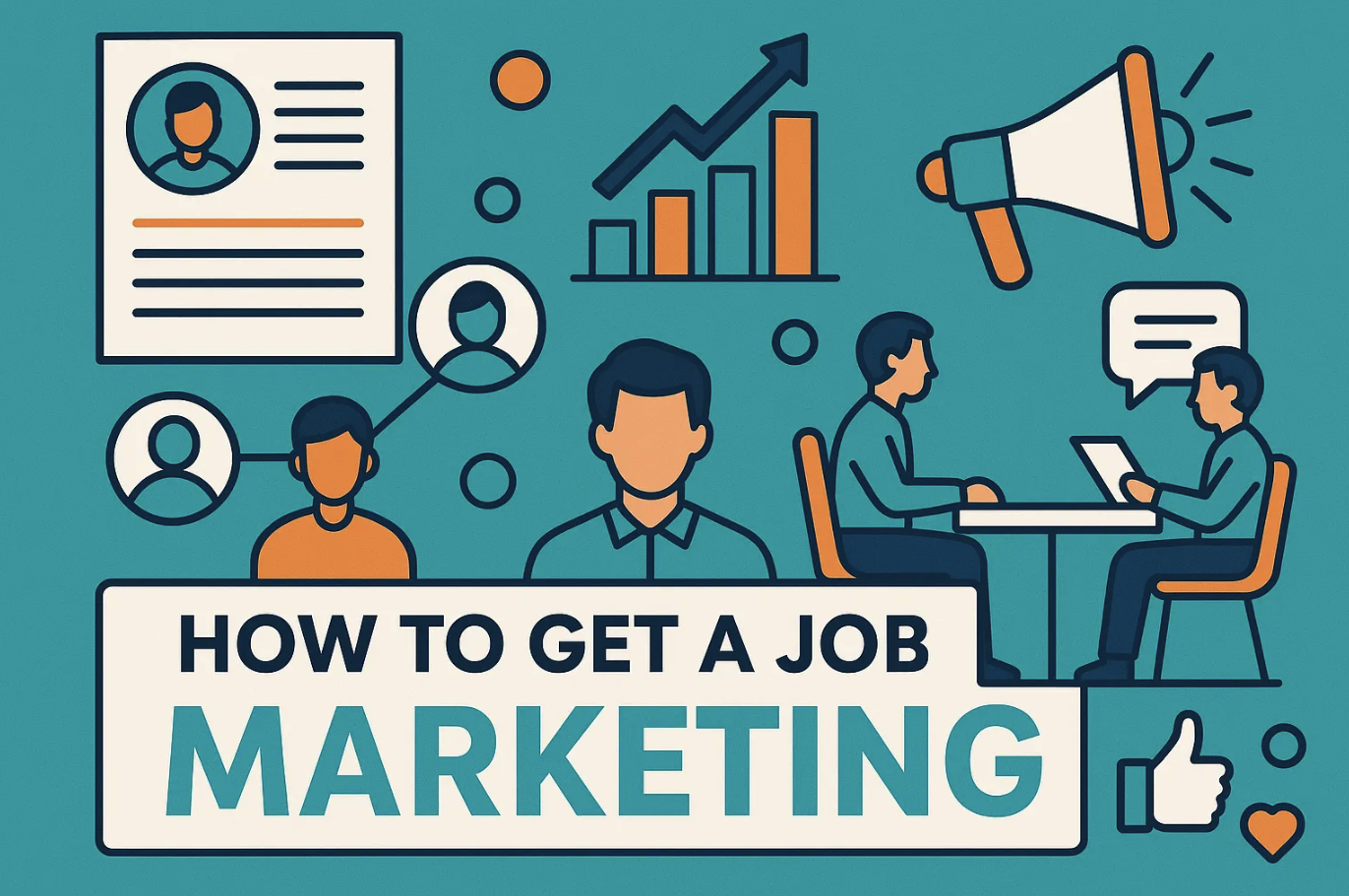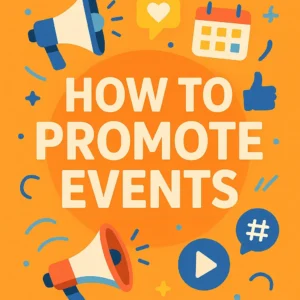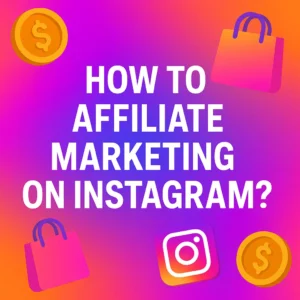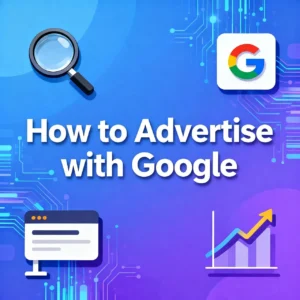
You don’t need prior experience to get a marketing job. Many professionals have started their careers from scratch and succeeded. You can do the same by focusing on the right steps. Marketing is a dynamic field that values creativity, problem-solving, and adaptability. Start by building your knowledge and skills. Learn the basics of marketing through free resources or online courses. Apply what you learn by creating personal projects or volunteering. These experiences will help you gain confidence and demonstrate your abilities.
Oh, and by the way, networking is equally important. Go connect with marketing professionals and attend industry events – these connections can open doors to opportunities and provide valuable insights. Take the first step today -> Start a blog, join a marketing group, or investigate career opportunities in marketing, and it will push you closer to your objective.
- Understand How to Get a Career in Marketing
- Build Knowledge to Start Your Marketing Career
- Gain Experience to Get Into Marketing
- Network to Get a Marketing Job
- Craft a Standout Application for a Marketing Job
- What You Need to Start Your Marketing Career
- Common Mistakes to Avoid When You Get Into Marketing
Understand How to Get a Career in Marketing
Breaking into marketing starts with understanding the roles available and identifying where your strengths align. Marketing offers a variety of paths, each with unique responsibilities and opportunities. Exploring these roles and narrowing your focus will help you take the first step toward your marketing career.
Explore Marketing Roles
Marketing is a broad field with roles that cater to different skills and interests. Here are some of the most common and in-demand roles:
|
Role |
Primary Responsibilities |
|---|---|
|
Plan and execute online campaigns, analyze performance, and engage with audiences. |
|
|
Social Media Manager |
Manage social media platforms, track engagement, and build customer relationships. |
|
Content Creator |
Develop creative content like blogs, videos, or infographics while maintaining brand consistency. |
|
SEO Specialist |
Optimize website content to improve search engine rankings and drive organic traffic. |
|
Email Marketing Manager |
Create and manage email campaigns to nurture leads and retain customers. |
These roles highlight the diversity within marketing. For example, if you enjoy working with data, SEO or analytics might be a good fit. Content creation or social media management could be your calling if creativity excites you.
Explore these options as they might help you understand how to get a career in marketing that aligns with your interests.
Identify Your Focus Area
Once you’ve explored the roles, it’s time to narrow your focus. Matching your strengths and interests with specific marketing roles will make your transition smoother. Follow these steps to identify your focus area:
-
Assess your transferable skills. Think about your previous experiences and identify strengths like communication, creativity, or problem-solving. These skills are valuable in marketing roles.
-
Research job descriptions. Look at postings for roles like digital marketing jobs or social media management. Pay attention to the required skills and responsibilities.
-
Bridge skill gaps. If you notice missing skills, take online courses or workshops to fill those gaps. Platforms like HubSpot Academy and Google Digital Garage offer free resources.
-
Gain hands-on experience. Start a personal project or volunteer to apply what you’ve learned. This will help you build confidence and a portfolio.
-
Build a network. Connect with professionals in your desired role. Networking can provide insights and open doors to opportunities.
Focusing on a specific area will help you stand out in the competitive marketing job market. Whether you aim for a digital marketing career or a role in content creation, understanding your strengths and aligning them with the right role is key.
Build Knowledge to Start Your Marketing Career
Starting a career in marketing requires a solid foundation of knowledge. Understanding the basics and developing essential skills will set you apart as you begin your journey. Here’s how you can build that foundation.
Learn Marketing Fundamentals
To succeed in marketing, you need to grasp its core concepts. These include understanding your product, pricing strategies, promotion channels, and customer engagement. Here are the key fundamentals every beginner should know:
-
Product: Learn how to present what you’re selling in a way that resonates with your audience.
-
Price: Research competitor pricing and understand what your target customers are willing to pay.
-
Promotion: Identify the best channels to promote your product, whether through social media, email, or paid ads.
-
Place: Ensure your product is accessible to customers, whether online or in physical stores.
-
People: Focus on customer service to build loyalty and encourage repeat business.
-
Process: Streamline delivery methods to provide a seamless experience.
-
Physical Evidence: Build a strong digital presence and branding to support your product.
You can learn these concepts through free or affordable resources. Some excellent options include:
-
Google Digital Garage: Fundamentals of Digital Marketing – A comprehensive course covering the basics of digital marketing.
-
HubSpot Academy: Ecommerce Marketing Training Course – Focuses on inbound marketing and ecommerce strategies.
-
Semrush Academy: Get a Job in Digital Marketing (with no experience) – Designed to help beginners secure their first marketing job.
-
Google Analytics Certification – Teaches how to track campaign performance and conversion rates.
-
Udemy: How to Build Your Social Media Marketing Strategy – Guides you in creating effective social media campaigns.
These resources will help you understand marketing principles and prepare you for real-world applications.
Develop Essential Skills
Marketing requires a diverse skill set. To stand out, focus on building these essential skills:
-
Communication and Storytelling: Learn to craft compelling messages that connect with your audience.
-
Data Analytics: Use data to understand customer behavior and improve your strategies.
-
Strategic Thinking: Plan campaigns that align with business goals and deliver measurable results.
-
Adaptability and Agility: Stay flexible to keep up with changing trends and technologies.
-
Digital Marketing: Master online tools and platforms to execute campaigns effectively.
Practicing with marketing tools can help you develop these skills. For example, use Canva to create visually appealing graphics, Google Ads to run paid campaigns, and email marketing platforms like Mailchimp to design and send newsletters. These tools are beginner-friendly and widely used in the industry.
As you practice, focus on applying your skills to real-world scenarios. Create a mock campaign, analyze its performance using analytics tools, and refine your approach. This hands-on experience will boost your confidence and prepare you for professional roles.
Building your knowledge and skills takes time, but every step you take brings you closer to your goal. Start small, stay consistent, and keep learning.
Gain Experience to Get Into Marketing
Gaining hands-on experience is one of the most effective ways to get into marketing. Practical experience allows you to apply your knowledge, build confidence, and showcase your skills to potential employers.
Here are three actionable ways to start building your marketing experience today.
Start a Personal Project
Creating a personal project is a great way to practice marketing strategies in a low-pressure environment. You could start a blog, launch a YouTube channel, or manage a social media account. Choose a topic you’re passionate about and focus on building an audience.
For example, if you enjoy fitness, you could create content around workout tips or healthy recipes.
Use analytics tools to track your progress. Platforms like Google Analytics or social media insights can help you measure performance. Pay attention to metrics such as website traffic, engagement rates, or follower growth. These numbers will show you what works and where you can improve. Refining your approach based on data will help you develop a results-driven mindset, which is highly valued in marketing roles.
Freelance or Volunteer
Offering your marketing services to small businesses or nonprofits is another excellent way to gain experience. Many organizations need help with tasks like managing social media, creating content, or running email campaigns.
Volunteering for these roles not only helps you build your skills but also provides personal fulfillment. This sense of purpose can enhance your creativity and motivation.
Freelancing is another option. Platforms like Upwork and Fiverr connect you with clients looking for marketing support. Highlight your passion for marketing in your profile to attract clients who value enthusiasm. Your volunteer work can also set you apart in a crowded market, serving as a unique selling point that appeals to potential clients. These experiences will help you build a strong foundation as you get into marketing.
Build a Portfolio
A professional portfolio is essential for showcasing your marketing expertise. Include an “About” section that briefly describes your background and interests. Add work samples and case studies that highlight your accomplishments. Use precise data and metrics to demonstrate the impact of your work. For example, you could include a case study showing how you increased social media engagement by 30% over three months.
Incorporate testimonials from clients or colleagues to add credibility. If you’ve earned any certifications or awards, list them to show your commitment to professional growth. Make sure your portfolio includes clear contact information and calls to action, so potential employers or clients can easily reach you.
When presenting your work, focus on measurable results. Define the goals of your projects and explain how you achieved them. Use visuals like charts or screenshots to make your portfolio more engaging. Highlighting your best work with compelling evidence will help you stand out in the competitive marketing job market.
Network to Get a Marketing Job
Networking plays a crucial role in helping you get into marketing. Building connections with professionals in the industry can lead to valuable insights and job opportunities. Here’s how you can use networking to get a marketing job.
Leverage LinkedIn
LinkedIn is a powerful tool for connecting with marketing professionals and showcasing your skills. To make the most of it, optimize your profile to attract recruiters and hiring managers.
-
Use a professional profile picture that clearly shows your face. This builds trust and makes your profile approachable.
-
Add a creative background photo that reflects your work or passions.
-
Write a compelling headline with relevant keywords, such as “Aspiring Digital Marketer” or “Content Marketing Specialist.”
-
Share your story in the “About” section. Highlight your skills, achievements, and goals while incorporating keywords.
-
Update your work experience with a focus on accomplishments rather than just responsibilities.
-
List your education and certifications to demonstrate your commitment to learning.
Once your profile is ready, start connecting with marketing professionals. Send personalized connection requests and mention why you’d like to connect. Join LinkedIn groups related to digital marketing jobs or other areas of interest. Engaging in discussions within these groups can help you learn and get noticed.
Attend Industry Events
Networking events, such as marketing meetups and conferences, provide excellent opportunities to meet professionals and learn about the industry. Participating in these events can help you:
-
Meet new people who share your interests.
-
Learn about different sectors within marketing.
-
Establish yourself as someone passionate about the field.
-
Build long-lasting connections that may lead to job opportunities.
To make the most of these events, plan ahead. Research the speakers, sponsors, and attendees to identify who you want to meet. During the event, stay engaged and attentive. Take notes during sessions and ask thoughtful questions.
Afterward, follow up with the people you meet. Send a quick message or email to thank them for their time and continue the conversation.
Apply for Entry-Level Roles
Once you’ve built your network, start looking for entry-level marketing jobs. These roles often include internships, apprenticeships, or junior positions. They provide a great opportunity to learn and grow while gaining hands-on experience. Search for roles that align with your focus area, whether it’s digital marketing jobs, content creation, or social media management. Be open to positions that may not seem perfect but offer room for growth. Highlight your transferable skills, such as communication and creativity, in your applications.
Networking can also help you discover hidden job opportunities. Many roles are filled through referrals, so let your connections know you’re looking for a marketing job. A strong network increases your chances of finding the right role and starting your career in marketing.
Craft a Standout Application for a Marketing Job
Creating a standout application is essential to securing a marketing job. Employers seek candidates who demonstrate their skills, passion, and potential. Follow these steps to craft an application that grabs attention.
Tailor Your Resume
Your resume should highlight the skills and experiences that make you a strong candidate for a marketing job. Customizing it for each role increases your chances of standing out.
-
Match your resume to the job description by using relevant keywords. For example, if the listing mentions “social media management,” include that term in your skills or experience section.
-
Focus on transferable skills like communication, creativity, and problem-solving. These are valuable in any marketing role.
-
Describe your achievements using the STAR method (Situation, Task, Action, Result). For instance, instead of saying “Managed a social media account,” write “Increased social media engagement by 25% through targeted campaigns.”
-
Keep your points concise and focused on how your skills benefit the employer.
Including certifications, projects, and volunteer work can also strengthen your resume. If you’ve completed courses like Google Digital Garage or HubSpot Academy, list them under a “Certifications” section. Highlight personal projects, such as blogs or social media accounts, to show your hands-on experience.
Write a Compelling Cover Letter
Your cover letter is your chance to explain why you’re passionate about marketing and how your skills align with the role. Use this opportunity to tell your story and connect with the employer.
-
Start with a strong opening that grabs attention. For example, “I am excited to apply for the Digital Marketing Specialist role at [Company Name], where I can combine my creativity and data-driven mindset to drive impactful campaigns.”
-
Share specific examples of your achievements. If you’re a recent graduate, mention academic accomplishments or internships. For instance, “During my internship, I implemented a social media strategy that increased engagement by 25%.” If you’re transitioning careers, focus on transferable skills and certifications.
-
Explain how your experience aligns with the company’s goals. Research the company’s marketing strategies and mention how you can contribute. For example, “I admire your focus on customer engagement and believe my expertise in email marketing can help enhance your retention efforts.”
End your letter with a confident call to action, such as requesting an interview or expressing enthusiasm for discussing your qualifications further.
Prepare for Interviews
Preparation is key to acing a marketing job interview. Researching the company and practicing your responses will help you feel confident and make a strong impression.
-
Learn about the company’s marketing strategies. Visit their website, social media pages, and recent campaigns. Understand their target audience and how they position their brand.
-
Practice answering common marketing interview questions. For example:
-
“How would you approach creating a social media campaign for a new product?”
-
“Can you share an example of a successful marketing project you’ve worked on?”
-
“How do you measure the success of a marketing campaign?”
-
Use the STAR method to structure your answers. For instance, if asked about a past project, describe the situation, the task you were assigned, the actions you took, and the results you achieved.
Bring examples of your work, such as a portfolio or case studies, to showcase your skills. Highlight measurable results, like “Increased website traffic by 40% through SEO optimization.” This demonstrates your ability to deliver tangible outcomes. Crafting a standout application requires effort, but it’s worth it. A tailored resume, compelling cover letter, and thorough interview preparation will set you apart and bring you closer to landing your dream marketing job.
What You Need to Start Your Marketing Career
Starting your marketing career requires more than just technical skills. Your mindset and approach play a significant role in your success. Two key traits—having a growth mindset and staying consistent—will help you navigate challenges and build a strong foundation.
A Growth Mindset
A growth mindset means believing in your ability to improve through effort and learning. In marketing, trends and tools evolve rapidly. You need to stay curious and open to change. For example, new social media platforms or updates to search engine algorithms can impact strategies. Adapting to these changes keeps you relevant and competitive.
Start by embracing opportunities to learn. Take online courses, read industry blogs, and experiment with new tools. If a campaign doesn’t perform as expected, analyze the results and identify areas for improvement. Treat setbacks as learning experiences rather than failures. This mindset will help you grow as a marketer and build confidence in your abilities.
Networking also benefits from a growth mindset. When you connect with professionals, ask questions and seek advice. Their insights can help you understand the industry better and refine your approach. Over time, this willingness to learn and adapt will set you apart in your marketing career.
Consistency and Persistence
Consistency and persistence are essential for long-term success in marketing. Building skills, gaining experience, and achieving results take time. Staying committed to your goals ensures steady progress, even when challenges arise.
Consistency is especially important in branding. Take Coca-Cola as an example. The company has changed its logo only twice in 135 years, while Pepsi has undergone six redesigns. This commitment to consistency has helped Coca-Cola maintain customer trust and loyalty. In 2023, Coca-Cola held 69% of the U.S. soft drink market, compared to Pepsi’s 27%. This demonstrates how sticking to a clear strategy can yield significant results.
Consistency means dedicating time each week to learning and practicing for your marketing career. Set small, achievable goals, such as completing a course or creating a portfolio piece. Track your progress to stay motivated. Persistence, on the other hand, involves pushing through obstacles. If you don’t land a job immediately, keep applying and refining your approach. Each application and interview is an opportunity to improve.
Combining consistency with persistence creates a powerful formula for success. Whether you’re learning new skills or applying for roles, staying focused and determined will help you start your marketing career and achieve your goals.
Common Mistakes to Avoid When You Get Into Marketing
Applying Without Research
Sending generic applications is one of the most common mistakes beginners make when applying for marketing jobs. Employers want to see that you’ve taken the time to understand their company and the role. Tailoring your application shows that you’re serious about the opportunity and have the skills they need.
Start by carefully reading the job description. Identify the key skills and qualifications the employer is looking for. Then, customize your resume to highlight how your experience matches those requirements. For example, if the role emphasizes social media management, include specific examples of how you’ve successfully managed social media accounts or campaigns. Avoid vague statements like “Managed social media” and use measurable results, such as “Increased Instagram engagement by 20% in three months.”
Failing to showcase relevant skills and experiences can hurt your chances of standing out. Describe your achievements using the STAR method (Situation, Task, Action, Result). This approach helps you present your experience in a clear and impactful way. Remember, a well-researched and tailored application can make all the difference in landing your first marketing job.
Neglecting Networking
Networking is a powerful tool that many beginners overlook. Building connections in the marketing industry can open doors to opportunities that aren’t advertised publicly. Many jobs are filled through referrals, so having a strong network increases your chances of finding the right role.
Start by creating a professional LinkedIn profile. Use it to connect with marketing professionals, join industry groups, and engage with relevant content. Personalized connection requests can help you build meaningful relationships. For example, mention a shared interest or compliment their work when reaching out. Attending industry events, both virtual and in-person, is another effective way to expand your network. These events allow you to meet professionals, learn about the latest trends, and gain insights into the field. After meeting someone, follow up with a thank-you message to keep the connection alive.
Networking isn’t just about finding jobs; it’s also about learning from others and staying informed about the industry.
Overlooking Practical Experience
Practical experience is essential for breaking into marketing, yet many beginners underestimate its importance. Employers value candidates who can demonstrate their skills through real-world examples. Even if you’re just starting, there are plenty of ways to gain hands-on experience.
Consider starting a personal project, such as a blog or social media account, to practice marketing strategies. Choose a topic you’re passionate about and focus on building an audience. Use analytics tools to track your progress and refine your approach. These projects not only help you develop your skills but also provide tangible results to showcase in your portfolio. Volunteering or freelancing is another excellent way to gain experience. Offer your marketing services to small businesses or nonprofits. Many organizations need help with tasks like creating content, managing social media, or running email campaigns. These experiences allow you to build your portfolio while making a positive impact.
Practical experience, even if unpaid, demonstrates your commitment and ability to apply what you’ve learned. It gives you the confidence to tackle professional challenges and sets you apart from other candidates.
Breaking into marketing without experience is entirely possible when you take the right steps. Focus on learning the basics, building your skills, and gaining practical experience. Networking with professionals and staying consistent in your efforts will help you stand out. Every small action, like starting a project or connecting with someone in the industry, brings you closer to your dream marketing job.
Take that first step today. Whether it’s enrolling in a course or creating a portfolio, your marketing career starts with action.


